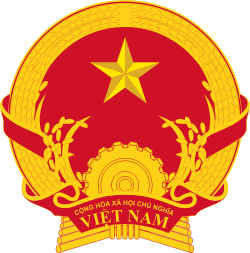Vietnamese Fatherland Front
Vietnamese Fatherland Front Mặt Trận Tổ Quốc Việt Nam | |
|---|---|
 | |
| Chairman | Nguyễn Thiện Nhân |
| Secretary-General | Vũ Trọng Kim |
| Founded | February 1977 |
| Headquarters | Hà Nội, Vietnam |
| Ideology | Communism, Left-wing nationalism |
| National Assembly |
496 / 500 |
The Vietnamese Fatherland Front (Vietnamese: Mặt Trận Tổ Quốc Việt Nam) founded February 1977 (merged Vietnamese Fatherland Front of North Vietnam, National Liberation Front of South Vietnam (Việt Cộng) and Alliance of National, Democratic and Peace Forces of Việt Nam in the South Vietnam), is an umbrella group of pro-government "mass movements" in Vietnam, and has close links to the Communist Party of Vietnam and the Vietnamese government. It is an amalgamation of many smaller groups, including the Communist Party itself. Other groups that participated in the establishment of the Front were the remnants of the Việt Cộng, the Vietnamese General Confederation of Labour, Vietnamese Pioneer Young Union and the Ho Chi Minh Communist Youth Union (aka the Hồ Chí Minh Youth). It also included the Democratic Party of Vietnam and Socialist Party of Vietnam, until they were disbanded in 1988.[1] It also incorporates some officially sanctioned religious groups.
The Front is described by the Vietnamese government as "the political base of people's power." It is intended to have a significant role in society, promoting "national solidarity" and "unity of mind in political and spiritual matters." Many of the government's social programs are conducted through the Front. Recently, it has been given a role in programs to reduce poverty. The Front is also responsible for much of the government's policy on religion, and has the ability to determine which religious groups will receive official approval.
Perhaps more importantly, the Front is intended to supervise the activity of the government and of government organizations. Because the Front's power base is mass participation and popular mobilization, it is seen as representative of the people, and both Vietnam's constitution and laws give it a special role. The Front has a particularly significant role in elections. Specifically, endorsement by the Front is generally required (in practice, if not in theory) to be a candidate for election. Almost all candidates are nominated by (and members of) the Front, with only a few "self-nominated" candidates avoiding the Front's veto. The Front's role in electoral nominations is mandated by law.
Leadership
Secretary General of the Vietnamese Fatherland Front since 1977:
- Nguyễn Văn Tiến (1977-1988)
- Phạm Văn Kiết (1988-1994)
- Trần Văn Đăng (1994-2004)
- Huỳnh Đảm (2004-2008)
- Vũ Trọng Kim (from 2008)
Chairman of the Vietnamese Fatherland Front since 1977:
- Hoàng Quốc Việt (1977-1983),
- Huỳnh Tấn Phát (1983-1988),
- Nguyễn Hữu Thọ (1988-1994),
- Lê Quang Đạo (1994-1999),
- Phạm Thế Duyệt (1999-2008),
- Huỳnh Đảm (2008-2013),
- Nguyễn Thiện Nhân (from 2013).
Formerly Front organisations

- League for the Independence of Vietnam (Việt Minh) founded by Hồ Chí Minh on 19 May 1941.
- Vietnamese National Popular League (Hội Liên hiệp Quốc dân Việt Nam or Liên Việt), founded on 29 May 1946. Head of League: Huỳnh Thúc Kháng (1946-1947), Bùi Bằng Đoàn (1947-1951).
- Vietnamese National Popular Front (Mặt trận Liên Việt), founded 1951, merged Viet Minh and Lien Viet. Chairman: Tôn Đức Thắng
- Vietnamese Fatherland Front (Mặt trận Tổ quốc Việt Nam), founded 1955 replaced Vietnamese National Popular Front. Chairman: Tôn Đức Thắng*
- National Liberation Front of South Vietnam (Việt Cộng), founded on 20 December 1960. Chairman: Nguyễn Hữu Thọ
- Alliance of National, Democratic and Peace Forces of Việt Nam, founded on 20 April 1968. Chairman: Trịnh Đình Thảo.
References
- ↑ Van, Dang. "The Rebirth of the Democratic Party of Vietnam and a basic principle of constitutionalism". newsgroups.derkeiler.com. derkeiler. Retrieved 4 March 2015.
External links
- Vietnamese Fatherland Front official website (in Vietnamese)
